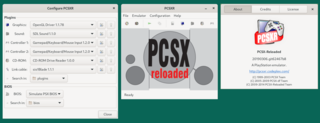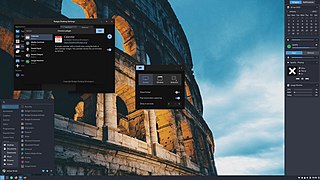CrossOver is a Microsoft Windows compatibility layer available for Linux, macOS, and ChromeOS. This compatibility layer enables many Windows-based applications to run on Linux operating systems, macOS, or ChromeOS.
A source port is a software project based on the source code of a game engine that allows the game to be played on operating systems or computing platforms with which the game was not originally compatible.
Cube 2: Sauerbraten is a first-person shooter released for Microsoft Windows, Linux, FreeBSD, OpenBSD, and Mac OS X using OpenGL and SDL.
This comparison only covers software licenses which have a linked Wikipedia article for details and which are approved by at least one of the following expert groups: the Free Software Foundation, the Open Source Initiative, the Debian Project and the Fedora Project. For a list of licenses not specifically intended for software, see List of free-content licences.

PCSX is a free and open-source, video game console emulator that allows software designed to be used with the Sony PlayStation to run on personal computers. Over the years, development changed hands several times with PCSX-Reloaded (PCSXR) now being the main version. As of 2021, the emulator seems to be no longer under active development. A newer, actively maintained fork of PCSX-Reloaded is PCSX-Redux.

Liberation is the collective name of four TrueType font families: Liberation Sans, Liberation Sans Narrow, Liberation Serif, and Liberation Mono. These fonts are metrically compatible with the most popular fonts on the Microsoft Windows operating system and the Microsoft Office software package, for which Liberation is intended as a free substitute. The fonts are default in LibreOffice.

SuperTuxKart (STK) is a free and open-source kart racing game, distributed under the terms of the GNU General Public License, version 3. It features mascots of various open-source projects. SuperTuxKart is cross-platform, running on Linux, macOS, Windows, iOS (beta), Android systems and Nintendo Switch (homebrew).
License compatibility is a legal framework that allows for pieces of software with different software licenses to be distributed together. The need for such a framework arises because the different licenses can contain contradictory requirements, rendering it impossible to legally combine source code from separately-licensed software in order to create and publish a new program. Proprietary licenses are generally program-specific and incompatible; authors must negotiate to combine code. Copyleft licenses are commonly deliberately incompatible with proprietary licenses, in order to prevent copyleft software from being re-licensed under a proprietary license, turning it into proprietary software. Many copyleft licenses explicitly allow relicensing under some other copyleft licenses. Permissive licenses are compatible with everything, including proprietary licenses; there is thus no guarantee that all derived works will remain under a permissive license.
Spacewalk is open-source systems management software for system provisioning, patching and configuration licensed under the GNU GPLv2.

The GNU General Public License is a series of widely used free software licenses, or copyleft, that guarantee end users the four freedoms to run, study, share, and modify the software. The license was the first copyleft for general use, and was originally written by Richard Stallman, the founder of the Free Software Foundation (FSF), for the GNU Project. The license grants the recipients of a computer program the rights of the Free Software Definition. The licenses in the GPL series are all copyleft licenses, which means that any derivative work must be distributed under the same or equivalent license terms. It is more restrictive than the Lesser General Public License, and even further distinct from the more widely-used permissive software licenses BSD, MIT, and Apache.

FreeCAD is a general-purpose parametric 3D computer-aided design (CAD) modeler and a building information modeling (BIM) software application with finite element method (FEM) support. It is intended for mechanical engineering product design but also expands to a wider range of uses around engineering, such as architecture or electrical engineering. FreeCAD is free and open-source, under the LGPL-2.0-or-later license, and available for Linux, macOS, and Windows operating systems. Users can extend the functionality of the software using the Python programming language.

aMSN was a free Windows Live Messenger clone. aMSN attempted to emulate the look and feel of Windows Live Messenger, and supported many of its features. It had been downloaded approximately 40 million times as of January 2011, making it the 21st most downloaded project on SourceForge.

awesome is a dynamic window manager for the X Window System developed in the C and Lua programming languages. Lua is also used for configuring and extending the window manager. Its development began as a fork of dwm, though has differed considerably since. It aims to be extremely small and fast, yet extensively customizable. It makes it possible for the user to manage windows with the use of keyboard.

OpenIndiana is a free and open-source illumos distribution descended from UNIX System V Release 4 via the OpenSolaris operating system. Forked from OpenSolaris after OpenSolaris was discontinued by Oracle Corporation, OpenIndiana takes its name from Project Indiana, the internal codename for OpenSolaris at Sun Microsystems before Oracle’s acquisition of Sun in 2010.

Desura was a digital distribution platform for the Microsoft Windows, Linux and OS X platforms. The service distributed games and related media online, with a primary focus on small independent game developers rather than larger companies. Desura contained automated game updates, community features, and developer resources. The client allowed users to create and distribute game mods as well.

RetroArch is a free and open-source, cross-platform frontend for emulators, game engines, video games, media players and other applications. It is the reference implementation of the libretro API, designed to be fast, lightweight, portable and without dependencies. It is licensed under the GNU GPLv3.

Unvanquished is a free and open-source video game. It is a multiplayer first-person shooter and real-time strategy game where Humans and Aliens fight for domination.

Budgie is an independent, free and open-source desktop environment for Linux and other Unix-like operating systems that targets the desktop metaphor. Budgie is developed by the Buddies of Budgie organization, which is composed of a team of contributors from Linux distributions such as Fedora, Debian, and Arch Linux. Its design emphasizes simplicity, minimalism, and elegance, while providing the means to extend or customize the desktop in various ways. Unlike desktop environments like Cinnamon, Budgie does not have a reference platform, and all distributions that ship Budgie are recommended to set defaults that best fit their desired user experience.













